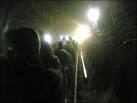Section for Pan-European IR Conference, Stockholm, September 2010
World politics has always been the subject of lay and academic stories. While interest in the storying of international politics has recently intensified, as has the general interest of IR in narrative theory, the epistemological status of narrative remains disputed, as does its political significance in specific contexts. Recent examples, such as NATO's view of the “battle of the narrative” as an essential enabler of military strategy, or the “global war on terror” as an enduring, morally saturated story, indicate divergent understandings of both narrative and strategy. In more instrumental perspectives, strategic narratives are formulated by states with the express purpose of influencing the foreign policy behaviour of other actors; in contrast, hermeneutical approaches see strategic narratives as sense-making devices and structured repositories of national history and identity. On the basis of these definitions, this section seeks to stimulate theoretically informed and conceptually precise debates on strategic narratives.
We invite paper submissions for three panels with set themes, and further proposals for full panels and/or papers.
I. Paper submissions are invited for the following three panels:
1. Narratives of Globalization - we invite papers that engage critically with Colin Hay and Ben Rosamond’s “logic of no alternative” and “economic imperatives” – Hay and Rosamond have confirmed their participation to the panel;
2. Narratives of Integration – we invite papers that engage critically with Frank Schimmelfennig’s concept of “rhetorical entrapment” as a strategic narrative – Schimmelfennig has confirmed participation to the panel.
3. Narratives of Crisis – we invite papers that discuss from a strategic narrative perspective the reaction to the financial and economic crisis
II. Panel and paper proposals are invited that engage strategic narratives from a variety of theoretical perspectives. The following issues are of particular interest:
- Theorising strategic narratives
- Narratives of security: e.g. the "GWOT", the "new Cold War", the "clash of identities", or the "return of geopolitics".
- Narratives about strategy: how do actors story their strategies - for war, surveillance, intervention, migration, or integration?
- Narratives with strategic impact: how are stories used to shape contexts of international politics?
- Strategies of narration: who, how, where and to whom are the stories of international politics told?
- Narratives of identity;
- Methodological and epistemological issues in the study of strategic narratives
Section Convenors
Felix Ciută, School of Slavonic and East European Studies, University College London
Email: f.ciuta@ssees.ucl.ac.uk
Alister Miskimmon, Department of Politics and International Relations, Royal Holloway, University of London
Email: Alister.Miskimmon@rhul.ac.uk
Ben O'Loughlin, Department of Politics and International Relations, Royal Holloway, University of London
Email: Ben.OLoughlin@rhul.ac.uk



